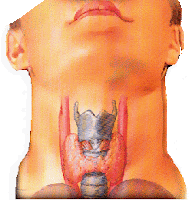
Hypothyroidism (hipotiroidismo/hipotireoidismo) is a decrease in thyroid hormone levels in blood plasma and consequently in tissues, which may be asymptomatic or cause various symptoms and signs of varying intensity throughout the body. We have 3% of the population patients at times, for his hidden, can receive psychiatric or psychological treatment when in fact they need is hormone replacement therapy. It is not easy to diagnose in its early stages.
Congenital hypothyroidism is one of genetic origin that appears at the time of birth. Early detection is important clinically tested because the children may have no apparent sign after birth. Thyroid hormones are necessary for normal growth and development of major organs like the brain, heart and respiratory system. If not treated properly at an early stage can lead to physical and mental disabilities. In spain and in turkey there is a protocol for early detection, diagnosis and treatment that is performed on all infants, is called the heel prick.
Also called hypothyroidism thyroidectomized. Is due to a loss of thyroid tissue with inadequate thyroid hormone synthesis despite maximal stimulation with thyrotrophic hormone. The destruction or loss of function of the thyroid may be due to multiple causes such as:
• Congenital. Or thyroid digenesis: is a congenital lack of thyroid tissue anatomy. You can be in complete agenesis or ectopic lingual thyroid. Congenital hypothyroidism occurs frequently associated with cretinism.
• Acquired. Or iatrogenic hypothyroidism: about a third of all cases of hypothyroidism. The lack of thyroid gland may be for thyroidectomy, such as that practiced in thyroid cancer ablation with radioactive iodine 131 to thyrotoxicosis or radiation therapy for head and neck tumors. Or idiopathic or primary hypothyroidism: is usually produced in most cases by autoimmune hypothyroidism because it is often associated with circulating auto antibodies and in some cases is the result of the effect of antibodies that block the TSH receptor. May be associated with other disorders such as diabetes mellitus, pernicious anemia, lupus erythematosus, rheumatoid arthritis, jorgen syndrome and chronic hepatitis. You may also be associated with adrenal insufficiency, gonadal parathyroid. It's called endocrine polyglandular syndrome. Chronic autoimmune hypothyroidism is the most common cause of primary hypothyroidism in developed countries and may also occur by the interaction of metals in the mouth (fillings and metal crowns). Or transient hypothyroidism: hypothyroidism is usually self-limiting, self-limited, associated with sub acute thyroiditis, silent, postpartum after a phase of hyper function.
Pituitary hypothyroidism
Also called secondary hypothyroidism. Is less than 5% of all hypothyroidism. Is due to a TSH hormone deficiency often due to an adenoma, more often, or a pituitary tumor, which can be confirmed or ruled out, usually by simple skull radiography to visualize the sella. When faced with an added hypothyroidism with symptoms that are not proper and more if they are hormonally have to think about secondary hypothyroidism which is a very different evolution and therapeutic.
So with concurrent hypothyroidism and gigantism be ruled out the presence of a pituitary adenoma producing excess growth hormone, causing gigantism, that growth is destroying the cells that stimulate the pituitary and thyroid causing hypothyroidism despite being completely healthy thyroid. Also necrosis, pituitary, postpartum (sheehan syndrome) may occur secondary hypothyroidism.
Causes of hypothyroidism
• Lack of iodine.
In areas of the world where iodine deficiency in the diet, such as the Congo, India, Ecuador or Chile, or in remote mountainous areas as the Andes and the Himalayas, severe hypothyroidism can occur in 5-15% of the population. For this reason often added iodine to table salt.
• Thyroiditis.
In developed countries, the most common cause of hypothyroidism is an autoimmune inflammation of the thyroid gland called chronic lymphocytic thyroiditis or hashimoto's thyroiditis (in honor of dr. Hakaru hashimoto, who described it in 1912). This disease is 5-10 times more common in women and causes very high levels of thyroid autoantibodies (such as can occur in graves' disease). Other thyroiditis, which can occur after pregnancy or a viral disease that can lead to transient hypothyroidism states.
• Thyroidectomy.
Thyroid surgery or radioactive iodine ablation (see hyperthyroidism, treatment) can cause hypothyroidism.
• Drugs.
In addition to antithyroid drugs (see hyperthyroidism, treatment), the lithium can cause hypothyroidism (used in mental illness), and paradoxically, certain drugs are very rich in iodine, such as amiodarone (trangorex ®), used in cardiac arrhythmias.
• Congenital hypothyroidism (cretinism).
Children born without a thyroid gland may develop mental retardation and growth, unless the situation is detected and treated early. Thus thyroid hormones measured in blood, routine, in all newborns.
Signs and symptoms
Patients with mild hypothyroidism may have no symptoms. The symptoms become more important as the disease worsens, and are generally associated with decreased metabolism. Common symptoms include fatigue, weakness, cold intolerance, and constipation. Other symptoms of hypothyroidism include drowsiness, weight gain, hair loss, mental dullness, depression, and increased cholesterol levels. Women may have menstrual abnormalities.
Treatment
Hypothyroidism can be treated successfully, and should be treated because if left untreated, can lead to serious heart disease (cardiomyopathy, heart failure), as well as a very serious situation called myxedema coma, which is often triggered by stress , concomitant diseases or surgery in severe hypothyroidism before and hospitably to be treated with intravenous thyroid hormones. Moreover, treatment of hypothyroidism is the thyroid hormone replacement with synthetic thyroid hormone levothyroxine (levothroid ®). The daily amount is usually required in 100-150 micrograms (0.100 to 0,150 milligrams). After six weeks of treatment, measuring levels of thyroid hormones and the pituitary hormone tsh. The goal of treatment is not so much to maintain a normal level of thyroid hormones, such as maintaining a normal level of tsh, which is the priority. Overtreatment of hypothyroidism is as dangerous as not treating.
(from : www.tuotromedico.com and www.wikipedia.com)
Feb 17, 2011
HYPOTHYROIDISM (HIPOTIROIDISMO)
Subscribe to:
Post Comments (Atom)


0 comments:
Post a Comment